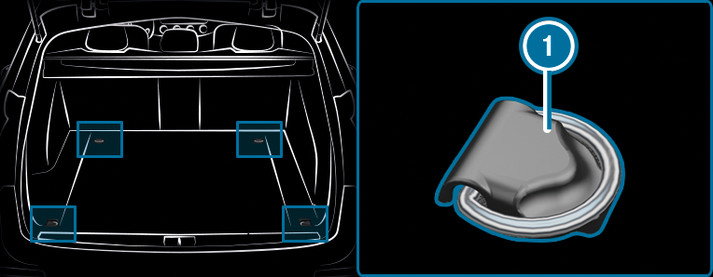When you load the roof, the vehicle centre of gravity rises and the driving characteristics change.
If you exceed the maximum roof load, the driving characteristics, as well as the steering and braking, will be greatly impaired.
Only use roof racks tested and approved by Mercedes-Benz.
Make sure that you can raise the sliding sunroof fully and open the tailgate fully once the roof rack is fitted.
The panoramic sliding sunroof cannot be opened if a roof rack is fitted. The panoramic sliding sunroof closes again automatically when it encounters resistance.
If the rear bench seat/rear seat and seat backrest are not engaged they could fold forwards, e.g. when braking suddenly or in the event of an accident.
If this is the case, the vehicle occupant would be forced into the seat belt by the rear bench seat/rear seat or by the seat backrest. The seat belt cannot protect as intended and could result in additional injury.
Objects or loads in the boot/load compartment cannot be restrained by the seat backrest.
If the seat backrest is not engaged and locked, this will be shown in the multifunction display in the instrument cluster.
The centre and outer seat backrests can be folded forwards separately.
The right outer seat backrest can only be folded forwards together with the centre seat backrest.
The outer seat backrests are electrically unlocked with the release handles in either the load compartment or beside the seat backrests.
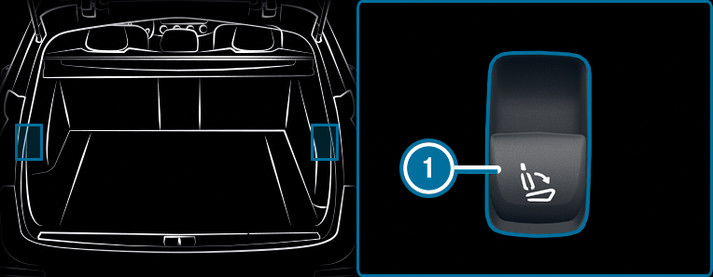
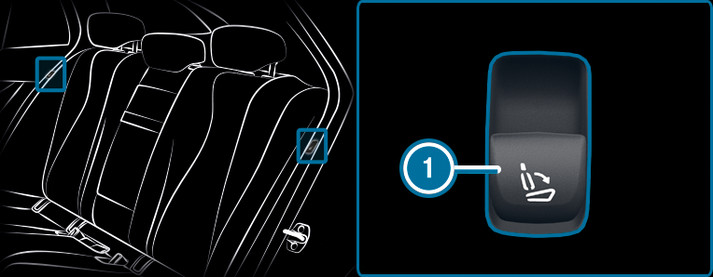
 .
. The corresponding seat backrest folds forwards.
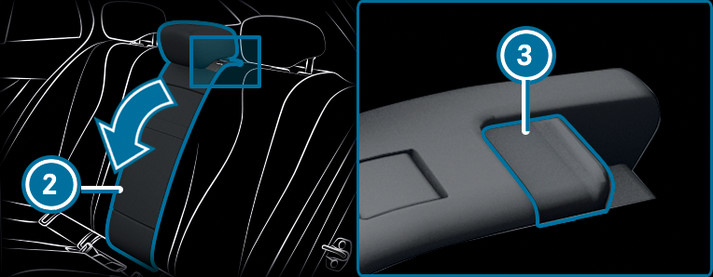
 release
release  forwards.
forwards.  forwards.
forwards. If the rear bench seat/rear seat and seat backrest are not engaged they could fold forwards, e.g. when braking suddenly or in the event of an accident.
If this is the case, the vehicle occupant would be forced into the seat belt by the rear bench seat/rear seat or by the seat backrest. The seat belt cannot protect as intended and could result in additional injury.
Objects or loads in the boot/load compartment cannot be restrained by the seat backrest.
The seat belt could become trapped and thus damaged when folding back the seat backrest.
If the seat backrest is not engaged and locked, this will be shown in the multifunction display in the instrument cluster.
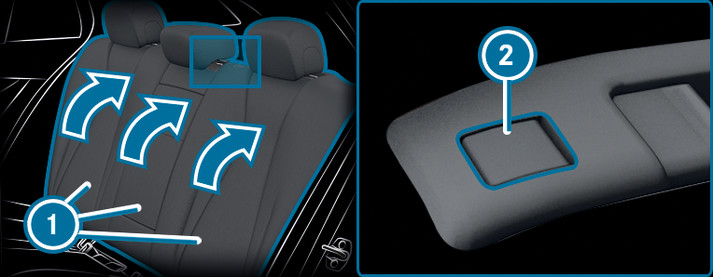
 back until it engages.
back until it engages. Left and right seat backrests: if the seat backrest is not correctly engaged, this will be shown in the multifunction display in the instrument cluster.
Centre seat backrest: if the seat backrest is not correctly engaged, red lock verification indicator  will be visible.
will be visible.
If you drive when the load compartment floor is open, objects could be thrown around and thereby strike vehicle occupants. There is a risk of injury, particularly in the event of sudden braking or a sudden change in direction.
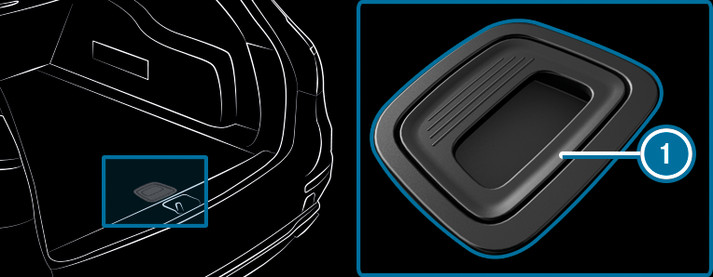
 downwards.
downwards.  .
.  down until it engages.
down until it engages. The through-load ski bag in conjunction with the lashing straps cannot restrain any objects other than skis.
If you transport other heavy or sharp-edged objects in the through-load ski bag
If you do not secure the through-load ski bag with the lashing straps
A maximum of four pairs of skis or two snowboards may be transported in the ski/snowboard bag.
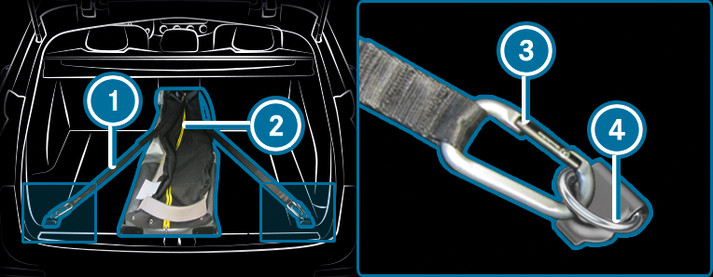
 , place the skis or snowboards inside the bag and close it.
, place the skis or snowboards inside the bag and close it.  onto hook
onto hook  in a crosswise pattern with the fastener facing upwards in tie-down eye
in a crosswise pattern with the fastener facing upwards in tie-down eye  .
. If the ball neck is not engaged, the trailer may come loose.
The fully-electric trailer hitch could be mechanically damaged by applying additional pressure when the ball neck is being extended or retracted.
the range of movement is clear
only when retracting: ensure trailer cables or adapter plugs have been removed
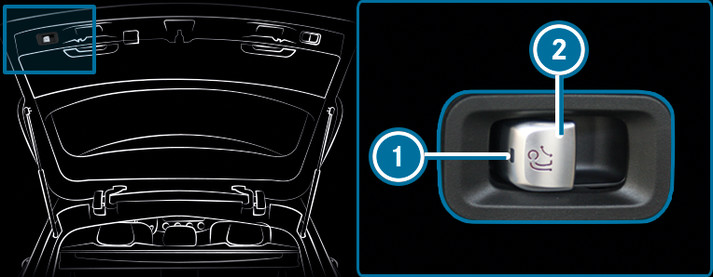
 .
. Indicator lamp  flashes and the Trailer coupling extending…display message appears in the multifunction display.
flashes and the Trailer coupling extending…display message appears in the multifunction display.
The ball neck extends fully electrically.
Wait until the ball neck has locked in place.
The ball neck is securely locked into place once indicator lamp  goes out.
goes out.
If the ball neck is not securely locked in place, indicator lamp  flashes and the Check trailer hitch lock display message appears in the multifunction display.
flashes and the Check trailer hitch lock display message appears in the multifunction display.
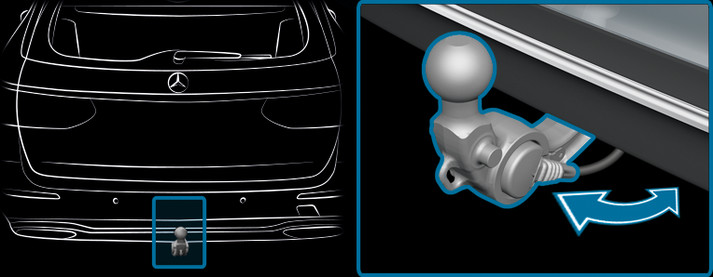
 .
. Indicator lamp  flashes and the Trailer coupling extending…display message appears in the multifunction display.
flashes and the Trailer coupling extending…display message appears in the multifunction display.
The ball neck retracts fully electrically.
Wait until the ball neck has locked in place.
The ball neck is securely locked into place once indicator lamp  goes out.
goes out.
If the ball neck is not securely locked in place, indicator lamp  flashes and the Check trailer hitch lock display message appears in the multifunction display.
flashes and the Check trailer hitch lock display message appears in the multifunction display.
If objects in the vehicle interior are stowed incorrectly, they can slide or be thrown around and hit vehicle occupants. In addition, cup holders, open stowage spaces and mobile phone receptacles cannot always retain all objects they contain.
There is a risk of injury, particularly in the event of sudden braking or a sudden change in direction.
Observe the notes on loading the vehicle.
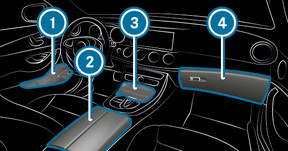




If objects in the vehicle interior are stowed incorrectly, they can slide or be thrown around and hit vehicle occupants. In addition, cup holders, open stowage spaces and mobile phone receptacles cannot always retain all objects they contain.
There is a risk of injury, particularly in the event of sudden braking or a sudden change in direction.
Observe the notes on loading the vehicle.
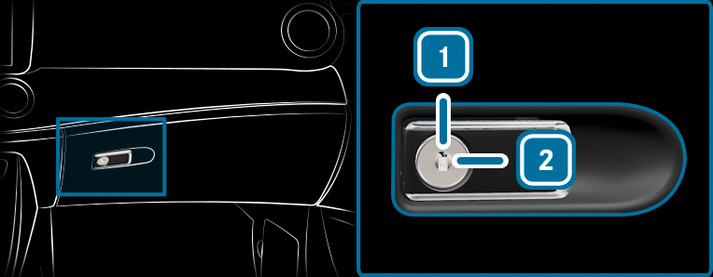
 (to lock) or anti-clockwise
(to lock) or anti-clockwise  (to unlock).
(to unlock). If objects in the vehicle interior are stowed incorrectly, they can slide or be thrown around and hit vehicle occupants. In addition, cup holders, open stowage spaces and mobile phone receptacles cannot always retain all objects they contain.
There is a risk of injury, particularly in the event of sudden braking or a sudden change in direction.
Observe the notes on loading the vehicle More.
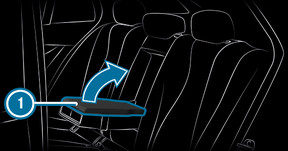
 and swing the cover of the armrest upwards.
and swing the cover of the armrest upwards. 

